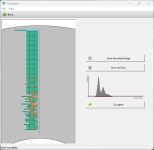Parallax Abstraction
Member
Hey everyone! I'm hoping some people in this awesome community might be able to provide me some guidance for a project I'm doing.
Backstory (skip this paragraph if it doesn't matter to you): I am slowly working at obtaining and archiving a series of monthly disks that were authored by the former National Capital Atari Users Group, here in Ottawa, Canada. They put out a ton of these for the Atari 8-bit and ST systems. They have loads of great community authored software and as far as I've been able to determine, have never been archived online. I recently found someone in town who has a bunch of their Atari ST disks. I've acquired a Greaseweazel and a new old stock 3.5" drive and am trying to rip them into a format that can be read by an emulator or written back to actual floppies.
As far as I can tell, all the disks I'm trying to rip are single sided and double density. Using Greaseweazel with the FluxMyFluffyFloppy GUI on Windows (though I have tried this with straight command line as well), I'm having no luck in getting disks to rip in a way that makes them usable. I've been using the "Atari ST 360kb DoubleDensity SingleSided (80 tracks)" template that comes with the GUI and have tried ripping to both MSA and ST formats. The following is the output I get when trying to rip to MSA format
It actually reads the disk all the way to the end, but gives that error and when I try to mount the image in Hatari, I get an error that the drive isn't responding.
If I try to read the risk into ST format, I just get this error:
I think this might be a bug in the GUI application itself, but I tried it with GreaseweazleGUI as well and it doesn't give this error, but still doesn't rip.
If I try any of the other templates, I get a ton of "Ignoring unexpected sector" errors.
I haven't found a lot of answers searching around online, but I have read that ST disks can be a bit touchy to rip properly. Does anyone have any experience ripping these disks with a Greaseweazel and any advice on what I could potentially do here? I'm very into this archiving project and want to make sure I get it right.
Cheers!
Backstory (skip this paragraph if it doesn't matter to you): I am slowly working at obtaining and archiving a series of monthly disks that were authored by the former National Capital Atari Users Group, here in Ottawa, Canada. They put out a ton of these for the Atari 8-bit and ST systems. They have loads of great community authored software and as far as I've been able to determine, have never been archived online. I recently found someone in town who has a bunch of their Atari ST disks. I've acquired a Greaseweazel and a new old stock 3.5" drive and am trying to rip them into a format that can be read by an emulator or written back to actual floppies.
As far as I can tell, all the disks I'm trying to rip are single sided and double density. Using Greaseweazel with the FluxMyFluffyFloppy GUI on Windows (though I have tried this with straight command line as well), I'm having no luck in getting disks to rip in a way that makes them usable. I've been using the "Atari ST 360kb DoubleDensity SingleSided (80 tracks)" template that comes with the GUI and have tried ripping to both MSA and ST formats. The following is the output I get when trying to rip to MSA format
Code:
C:\COMSTUFF\greaseweazle-1.16.1\FluxMyFluffyFloppy>"C:\COMSTUFF\greaseweazle-
p=1 --revs=3 "C:\COMSTUFF\No Save\test.msa"
Reading c=0-79:h=0 revs=3
<trimming all but the last 5 tracks for brevity>
T75.0: Raw Flux (170493 flux in 768.90ms)
T76.0: Raw Flux (148015 flux in 770.07ms)
T77.0: Raw Flux (147813 flux in 769.95ms)
T78.0: Raw Flux (147845 flux in 769.94ms)
T79.0: Raw Flux (147937 flux in 770.03ms)
** FATAL ERROR:
MSA: Track 0.0 is not an IBM track: Maybe missing --format= option?It actually reads the disk all the way to the end, but gives that error and when I try to mount the image in Hatari, I get an error that the drive isn't responding.
If I try to read the risk into ST format, I just get this error:
Code:
C:\COMSTUFF\greaseweazle-1.16.1\FluxMyFluffyFloppy>"C:\COMSTUFF\greaseweazle-
p=1 --revs=3 "C:\COMSTUFF\No Save\test.st"
Reading c=0-79:h=0 revs=3
** FATAL ERROR:
Sector image requires a disk format to be specifiedI think this might be a bug in the GUI application itself, but I tried it with GreaseweazleGUI as well and it doesn't give this error, but still doesn't rip.
If I try any of the other templates, I get a ton of "Ignoring unexpected sector" errors.
I haven't found a lot of answers searching around online, but I have read that ST disks can be a bit touchy to rip properly. Does anyone have any experience ripping these disks with a Greaseweazel and any advice on what I could potentially do here? I'm very into this archiving project and want to make sure I get it right.
Cheers!

